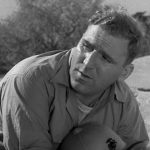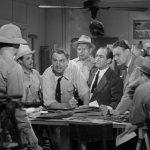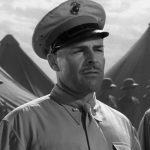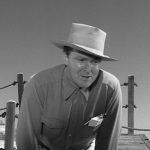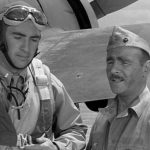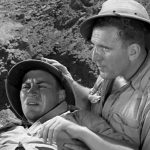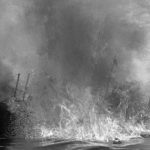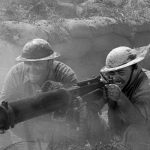
Wake Island – 1942
This was a film of contradictions. There were some really awesome things, but at the same time, there were some incredibly stupid things. Some of the characters were great while others were idiotic. Some were characters and others were caricatures. But overall, the filmmakers told a good story. The scenes of war and battle were exciting enough and well-executed.
The film is a war film that told a fictionalized story of the men who defended Wake Island, a tiny island in the Pacific near Guam and Hawaii. It was occupied by American forces at the time of the attack on Pearl Harbor. During the narration at the beginning of the movie, the filmmakers went out of their way to announce to the audience that the events in the film are as accurate as they could be, and except for the ending, they were pretty accurate.
According to the film, the same day as the bombing of Pearl Harbor, the Japanese sent ships and fighter planes to attack Wake Island. The men defending the island really proved their superior toughness as they defended the military outpost, one attack after another, day after day, week after week. They withstood everything the Japanese forces could throw at them, fighting to the death to the last man.
However, in reality, there was only one bombing on December 8, one battle on December 11, and the American surrender on December 23. Though the defending garrison really put up an incredible fight, they were overwhelmed by superior numbers. They repelled several ground assaults before being overrun. But by the end of the battle, the Americans had no choice but to surrender.
Now, here is what was really impressive about the real battle. According to Wikipedia, “The American casualties numbered 52 military personnel and approximately 70 civilians killed. The Japanese losses exceeded 700 dead with some estimates ranging as high as 1,000. Wake’s defenders sank two Japanese destroyers and one submarine, and shot down 24 Japanese aircraft.”
Granted, a lot of that was shown, though the impressive numbers were not. The film spent too much time trying to humanize the plot. Instead of concentrating on the exciting fighting or the real aftermath of the conflict, they gave us the stories of 4 different men. There was the vapid story about Pvt. Randall, a dumb brawler with a patriotic heart, played by William Bendix, and his friend, Pvt. Doyle, played by a very young Robert Preston. There was the story of the civilian construction worker, Shad McClosky, played by Albert Dekker, a man who wouldn’t take orders from any military personnel, but showed his true red, white, and blue colors when the fighting started. And finally there was the story of Major Caton, played by Brian Donlevy, the officer who shouldered the burden of command and inspired his troops to achieve greatness.
Randall’s story wasn’t believable. He was a former wrestler whose answer to every personal conflict was to start a fist fight, and Doyle wasn’t much better. The real Marine Corps would not tolerate that kind of behavior and he would be arrested after the first incident. McClosky’s story was more palatable. Sure, he was a civilian, resistant to taking orders, but when it came down to it, he died fighting like everyone else. But it was really the character of Major Caton that gave the film its best drama. As the commanding officer, it must have been difficult to stand strong in the path of the enemy, knowing that defeat was a certainty. Donlevy did a great job in the roll, giving the performance a sense of gravitas and unwavering patriotism.
I mean, think about it. The film was released in 1942. WWII was still in full swing. The real events of Wake Island had only taken place 9 months earlier. This film was meant to inspire people to support the war effort, plain and simple. If I had any complaints about the movie, it would only be about something that offended my modern sensibilities, though in 1942 it must have been effective as anti-Japanese propaganda. The Japanese people were portrayed as sinister, evil villains. I found myself rolling my eyes at Rudy Robles’ portrayal of Triunfo, the Japanese ambassador who professed peace with his exaggerated squinty eyes and buck teeth.
